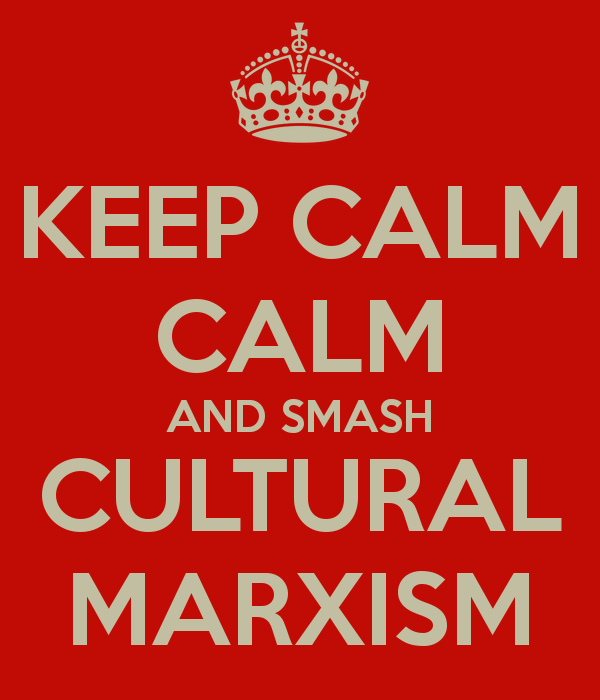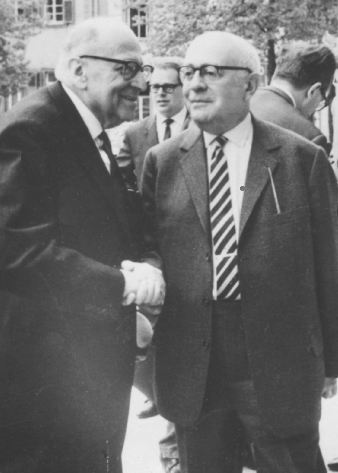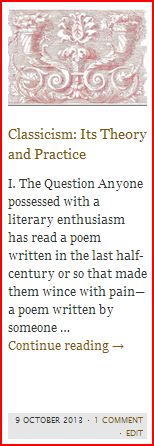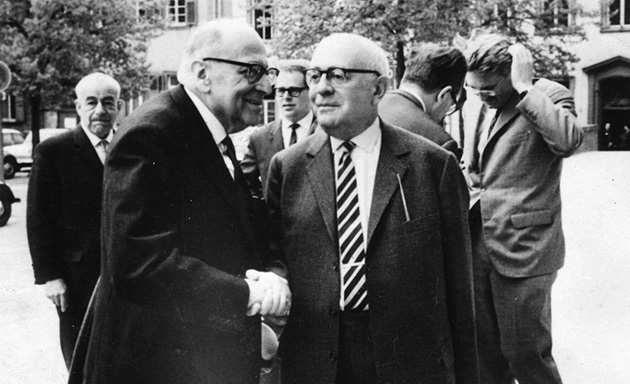
A Traditionalists’ Credo for the 21st Century? The modern counter-revolutionary will require a steady mind and open eyes.
The Right-Wing Slogan of the Year for 2013 was Smash Cultural Marxism (followed shortly by Anti-Racist is a Code Word for Anti-White). It’s unclear if anyone can account for the sudden popularity of the term. ‘Cultural Marxism’, though generally thrown around regarding claims of deracination and Islamification, is a very real idea, and one that’s been around for almost a century. At its inception, it wasn’t used disparagingly, either. Cultural Marxism is a definite school of thought promoted by those who believe the ‘Culture War’ is the first battleground for a Marxian-style revolution, violent or otherwise. Who exactly is promoting Cultural Marxism? The well-known but poorly-understood Frankfurt School.

Theodor Adorno and Max Horkheimer at Heidelberg, Germany.
The Frankfurt School is, by any fair assessment, one of the most brilliant collections of human minds that appeared in the 20th century, rivaling the Inklings and the Bloomsbury Group in terms of sheer creative genius—though the Frankfurt School wasn’t primarily a literary group. Their mental powers were focused on sociology, economics, psychology, and philosophy. The Frankfurt School managed to syncretize almost every materialist intellectual trend of the 19th and 20th century into a complete systematic rendering of… well, nearly every facet of human life. Death, taxes, the human mind, the course of history: you name it, the Frankfurt School has an opinion and arguments to back them up, all of which draw on the same basic principles.
Conservatives are prone to whine that academic institutions are overrun with Marxists, but they seldom ask how this came to pass. They reckon it’s foul play, as though a group of bearded men in fatigues kidnapped 80% of university professors and brainwashed them into waving the Red Flag. But the inconvenient truth would be that they earned it, fair and square.
Whereas Conservatives were busy producing the greatest writers and thinkers who ever lived, the Marxists were undertaking a project so creeping and vast it was unstoppable by the time anyone realized what was going on. Foregoing much of the art and common-sense that Conservatives like T.S. Eliot and G.K. Chesterton mastered, they created two weapons far more deadly: polemics and philosophy.
 As human beings, we’re all horribly susceptible to pride. Conservatives are at least aware that “pride comes before the Fall” and all that, but progressives of all sorts treasure it more than any man has ever treasured a diamond or a pearl or a slave or an empire. Progressives have no desire more than to Fall. They want the forbidden knowledge, believing nothing that can be known would ever do mankind any harm. They celebrate sexual awakening. They encourage Black Pride, Gay Pride, Womyn Pryde, etc. because Pride is profoundly empowering. Satan, we know, can offer every great city in the world to him who turns away from God. “Well, why wouldn’t anyone take all the cities of the world?’ the Progressive asks. They don’t believe in God anyway, so there’s nothing else to aspire to. Materialism is the tool of Satan according to Christianity. But if you don’t believe in Satan, or for that matter God, the choice isn’t at all difficult.
As human beings, we’re all horribly susceptible to pride. Conservatives are at least aware that “pride comes before the Fall” and all that, but progressives of all sorts treasure it more than any man has ever treasured a diamond or a pearl or a slave or an empire. Progressives have no desire more than to Fall. They want the forbidden knowledge, believing nothing that can be known would ever do mankind any harm. They celebrate sexual awakening. They encourage Black Pride, Gay Pride, Womyn Pryde, etc. because Pride is profoundly empowering. Satan, we know, can offer every great city in the world to him who turns away from God. “Well, why wouldn’t anyone take all the cities of the world?’ the Progressive asks. They don’t believe in God anyway, so there’s nothing else to aspire to. Materialism is the tool of Satan according to Christianity. But if you don’t believe in Satan, or for that matter God, the choice isn’t at all difficult.
With their validation of Pride, true Cultural Marxists have bred the most useless sort of academia in world history. Every great university in the Western World encourages their English Majors to read classic texts according to Feminist and ‘Queer’ Theory, highlighting political connotations that the author wasn’t even aware existed. Their philosophy majors are encouraged to write essays according to prompts such as ‘Define the Self’ without referencing any sort of religious doctrine—for example, if any sort of ‘Soul’ is involved, it must be in an acutely non-literal sense. These exercises have no value whatsoever. Modern English programs offer no aesthetic or cultural enrichment, and philosophy programs don’t teach students more about themselves anymore than an Introduction to Anatomy course might. I remember having to write an essay for a philosophy class on Epiphenomenalism and Semantic Epiphenomenalism. Do I have to explain how positively useless that struck me as? The humanities are being reduced to a form of natural and political science: if your conclusion isn’t biological, it must be social; if it’s neither social nor biological, it’s not appropriate for the course you’re taking.
 Likewise, Conservatives are anxious to see religious ideas become more accepted in academic environments. Arguments like Aquinas’s, for example, are almost absurdly simple, and most Conservatives are convinced they’ve been muted to suit the Cultural Marxist agenda. But they’ve got it backwards. It’s not Marxism that trumps our simple Christian ideas; it’s the simplicity itself that they find untenable.
Likewise, Conservatives are anxious to see religious ideas become more accepted in academic environments. Arguments like Aquinas’s, for example, are almost absurdly simple, and most Conservatives are convinced they’ve been muted to suit the Cultural Marxist agenda. But they’ve got it backwards. It’s not Marxism that trumps our simple Christian ideas; it’s the simplicity itself that they find untenable.
If we’re going to take philosophy in its literal sense, philo, (‘the love of’), Sophia (‘Knowledge’), common-sense is the place to start. Conservatives study philosophy, frankly, because we love to know things, but more importantly because we love to know things that make us better people. We study Aristotle because we’re interested in how the relationship between a master and a slave differs from that of a father and a son, or a governor and a citizen. We study Plato because we wonder how much of the joy we find in life comes from the body or from something higher. We might even study Averros because we’re interested in what exactly this thing called ‘knowledge’ is. Progressive academics, on the other hand, study T.H. Huxley’s exposition of Epiphenomenalism to prove that “mental activities are simply epiphenomena of the neural processes of the brain.” For better or worse, that sort of thing doesn’t generally interest Conservatives. T.S. Eliot, who earned (but never collected) his Doctorate in Philosophy from Harvard, is said to have reread his thesis on F.H. Bradley toward the end of his life and admitted he didn’t understand half of it anymore. Modern philosophy doesn’t make you a better person, so Conservatives don’t take a keen interest in it. When I told Seyyed Hossein Nasr, under whom I studied mysticism and Islamic thought at the George Washington University, that I wanted to major in philosophy, he told me not to bother. “Philosophy is dead in the West,” I remember him telling me. It’s still a discipline, sure, and a complex one at that. But it’s not life-giving. It’s not really philosophy, the love of wisdom, anymore. It’s materiology, the study of material realities.

Seyyed Hossein Nasr: “Philosophy is dead in the West.” As deconstruction replaces analysis, the ability to think diminishes even among the intelligentsia.
But that’s why ‘Cultural Marxists’ love it. They can speculate on whether thought is a function of action or vice-versa, and write a thousand-page book on the topic, and win all the acclaim of an Augustine or an Epicurus. The latter railed against religious thought because he thought it was a hindrance to human advancement; modern philosophers don’t care about human advancement. They care about defending ideas that are too complex to have any impact on how people live. In the same way I might see an ancient Egyptian glyph and be mystified by its hidden meaning, while an Egyptologist would read the thing and tell me it’s a 10,000-year-old grocery list, the Cultural Marxist academics can speak their own cryptic language that, when you understand the script, amounts to so much nothing. Like the strange, secret orders of Hermeticists and Theosophists (cheap mockeries of the old Hermetic and theosophical disciplines) that were so fashionable in the 20th century, the new vogue of Academicism owns its own language, decorates its own sashes, reads from its great big books, looks down on its dewy-eyed initiates, makes a show of itself, and yet it can’t effect real change in people’s lives. But that’s not the goal of Academicism anyway. Not anymore.
This is where the pride comes in. Philosophers, when they’re not accountable to common-sense or human betterment, can write books and earn degrees about virtually nothing and win every praise that was once reserved for those whose ideas made individuals and communities more well-rounded, more prosperous, and just plain happier. A Conservative could never accept such a change. For one, if a philosopher was content to busy himself with tedious and unhelpful ideas, the Conservative wouldn’t call that mind ‘great’ in the same way Spinoza or Laozi were great—maybe in the way that Marcus Elieser Bloch was a great ichthyologist: that’s fine for ichthyology, but for the most part, who really cares?

Roger Scruton: Modern art is self gratifying. As higher ideals are ejected for self-worship, relativism and a rejection of objectivity, aesthetics suffer.
Though the problem runs deeper still. Roger Scruton famously claimed that modern art is a self-gratifying lie, where the artist is agreed to be a creative genius and their admirers the possessors of a very progressive and discerning palate. Whether or not that’s true, the same might be said about the humanities. Anyone can be a master while making no real contribution to human society. Anyone can lock themselves away in a library and speculate as to whether the ‘Self’ is a physical or a mental or a psychological condition. Carl Jung, one of the greatest psychologists in history, said something to the effect of, “You and I know what thinking is, but ask a philosopher what thinking is and he won’t be able to tell you. A philosopher is someone who doesn’t know what it means to think.” For many of us, that’s a sad reflection of how far we’ve fallen from The Republic and The Leviathan, however much we may hate Plato or Hobbes.

Carl Jung: A philosopher is someone who doesn’t know what it means to think.
The Frankfurt School brilliantly changed the whole game of academics. Only with a purely Marxist, Freudian, materialist frame of mind could we occupy ourselves with such useless speculation as, ‘is it bigotry to prefer intercourse with one sex over another?’ Granted, Medieval philosophers came up with gems like, ‘how many angels can dance on the head of a pin?’ but why Cultural Marxists think one is more ridiculous than the other is beyond me. Just as the Enlightenment had swept away useless speculation on spiritual matters, the Frankfurt School and their brand of Cultural Marxism offered an alternative: speculate uselessly on material matters and you can still get the awards, the big office, and the lecture hall full of sycophantic first-years. Conservatives really can’t compete with them at their own game, but if we’re going to go around demanding that Cultural Marxism be smashed, we ought to know what it is we’re up against.
The rest of the essays in this series will look at ways we might match the Frankfurt School tit for tat—a sort of Cultural Traditionalism if the term suits us. In part II, I’ll address the French Existentialists and why their ideas needn’t inspire the wrenched fear that they do; in Part III I’ll discuss Carl Jung and Analytical Psychology as an alternative to the Freudian orthodoxy that dominates the Academic understanding of human nature; Part IV will be devoted to that silliness called ‘human’ or ‘natural rights’, and why it’s time we threw the whole idea out; and Part V will take a stab at a socio-economic theory that I’m convinced will emerge as the Conservative Principle of communal order: Distributism.
Where the Frankfurt School is a decidedly Revisionist take on Marxism, a Conservative counter-attack will have to be equally courageous in its ability to adapt to new ways of thinking and seeing the world. That’s not to say we have to change what Conservatism stands for. Far from it: if anything, we’ll see that the best new developments in philosophy, science, and sociology affirm everything our ancestors intuitively knew to be true. By the end of the fifth essay I hope we can agree on just one point: Conservatives have no need to fear the passage of time. Our principles are just as true now as they’ve ever been.
– M. W. Davis
The author is a native Bostonian currently studying at the University of Sydney. He is an officer of the Australian Monarchist League. His personal blog is “The American High Tory”.
Editorial Note
- All caption text is by SydneyTrads Editors.






Gwiz a bit unrelated but we are searching for an online book that we believe might have been posted here.
I cant remember the title but it is a critique of democracy, an old book dating back to about the 1930s.
Thanks?
Perhaps Oswald Spengler’s Decline of the West?